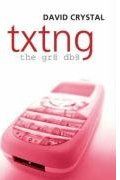text messaging analysed, described, and defended
Ever since Text messaging first began there have been moans and complaints that it was lowering standards of literacy, corrupting our youth, and bringing about the collapse of Western civilization. Even the normally rational John Sutherland, writing in the Guardian, complained about texting:
Linguistically, it’s all pigs ear … it masks dyslexia, poor spelling and mental laziness. Texting is penmanship for illiterates.
 David Crystal has answers for every one of these common objections. Texting isn’t even that new: writing in abbreviated forms has been around for a long time. Other languages (such as Hebrew and Arabic) do not use vowels as part of their writing system. In actual fact, the amount of abbreviating and acronyms such as ROFL is quite small. And most convincing of all to me, users in other languages all follow more or less the same ‘rules’ for abbreviation.
David Crystal has answers for every one of these common objections. Texting isn’t even that new: writing in abbreviated forms has been around for a long time. Other languages (such as Hebrew and Arabic) do not use vowels as part of their writing system. In actual fact, the amount of abbreviating and acronyms such as ROFL is quite small. And most convincing of all to me, users in other languages all follow more or less the same ‘rules’ for abbreviation.
What’s more, the use of pictograms and logographs have been around for a long time; the rebus or word puzzle is an ancient tradition in UK and other cultures; and reducing terms to their initial letters is deeply enshrined in our culture – as in pm, NATO, eg, asap, OK, and GHQ.
The same is true for omitting letters, or ‘clipping’ as it’s known technically. Mr and Mrs are cases in point. Any form of word shortening makes complete sense in an SMS system, and nobody has any problem failing to recognise Tues(day), approx(imately), biog(raphy), mob(ile), gov(ernment), poss(ible), and uni(versity.
Crystal has a good chapter on the amazing literary aspirations of the SMS poets and writers – people who compose haikus, short stories, and even serial novels using this extraordinarily restricted form.
In terms of users, women are more adept and enthusiastic than men, and another interesting feature he reveals is that text messaging was late to take off in the USA – for two reasons. One was that phone calls were cheaper there, and the other is that many people need to drive to get about, unlike European countries and Japan, where the country is smaller and more people use public transport.
The content of text messages varies from personal greetings and co-ordinating social activity to political electioneering, advertising, and even schemes to quit smoking. Crystal lists plenty of examples which I imagine will be good stimulus material for the A level students doing language projects who will find this book particularly useful.
At a more advanced level, he also looks at how other languages handle text messaging. Unsurprisingly, it turns out that all of them do more or less the same thing, though some even mix English abbreviations with their own language – which is called ‘code-mixing’. This is an example from German:
mbsseg = mail back so schnell es geht (‘as fast as you can’)
He ends by allaying the fears of all those who think text messaging lowers any kind of standards of literacy, or communication. In fact the reverse is true. And to prove that he’s done his homework he ends with a huge glossary of terms and multiple lists of text message abbreviations in eleven different languages. U cnt gt btr thn tht!
© Roy Johnson 2009
David Crystal, Txtng: The Gr8 Db8, Oxford: Oxford University Press, 2009, pp.256, ISBN: 0199571333
More on digital media
More on technology
More on theory